Edwin Arlington Robinson Poems
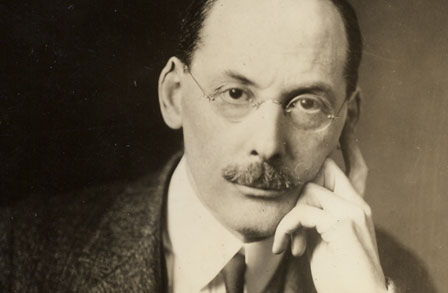
Edwin Arlington Robinson December 22, 1869 – April 6, 1935 American Poet and Pulitzer Prize winner |
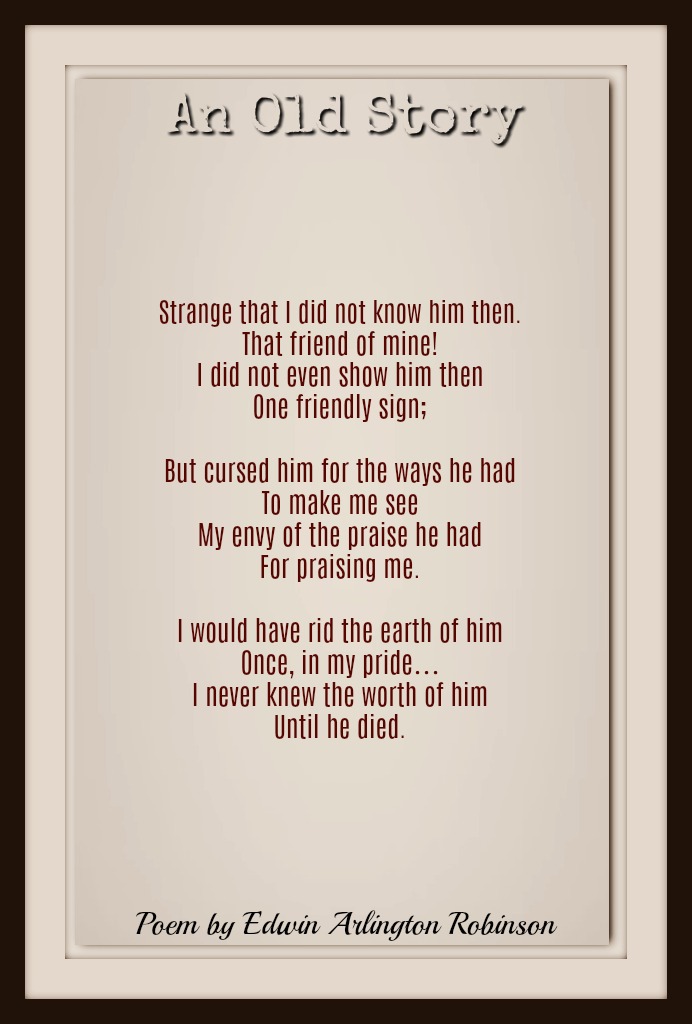 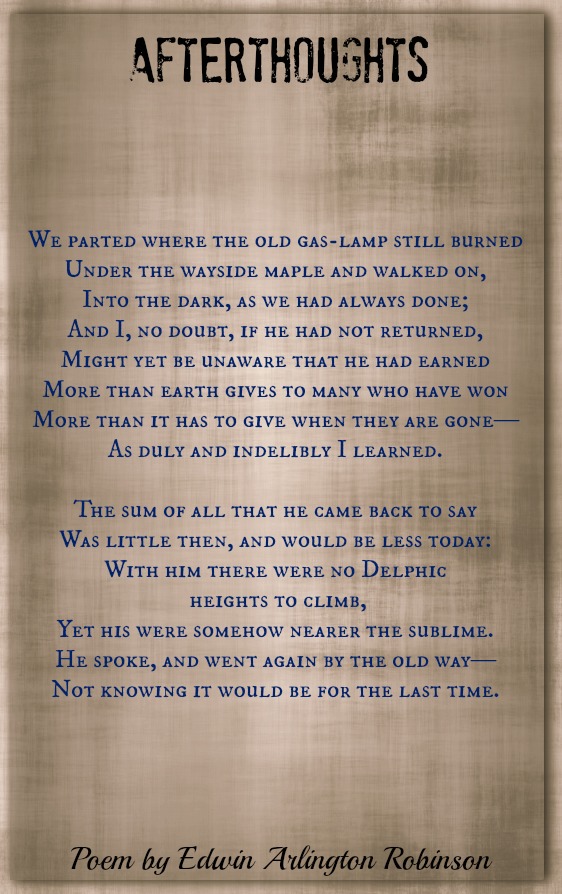 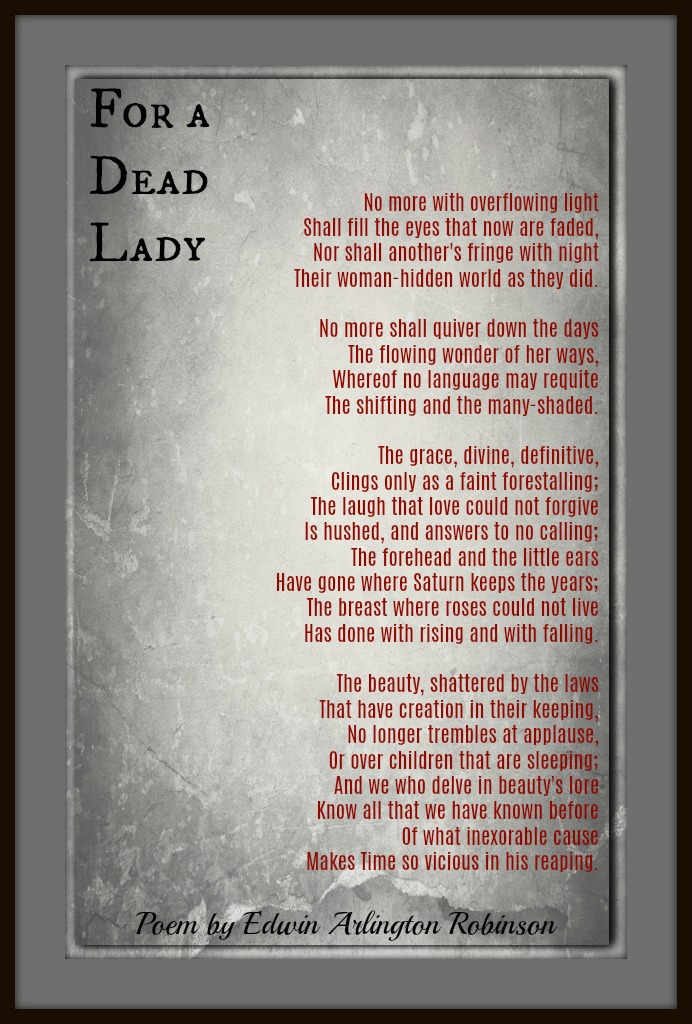 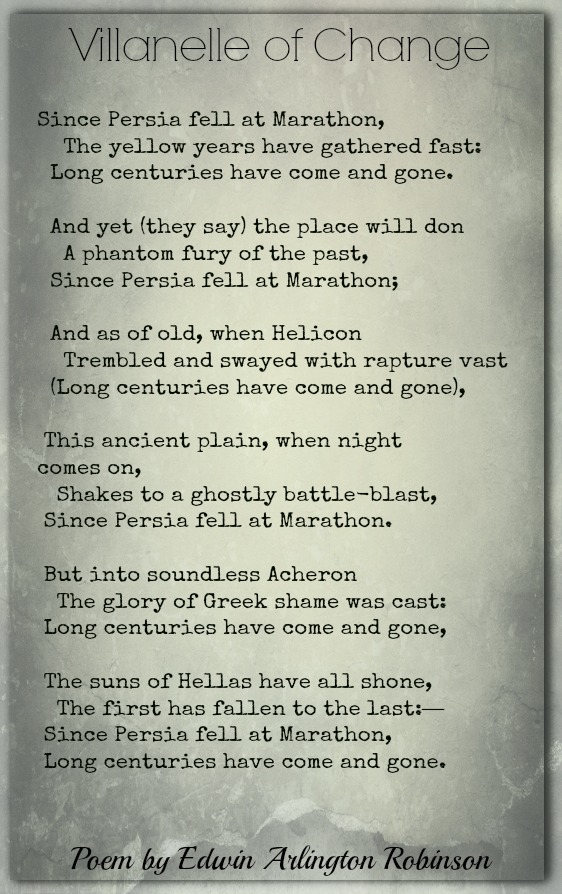 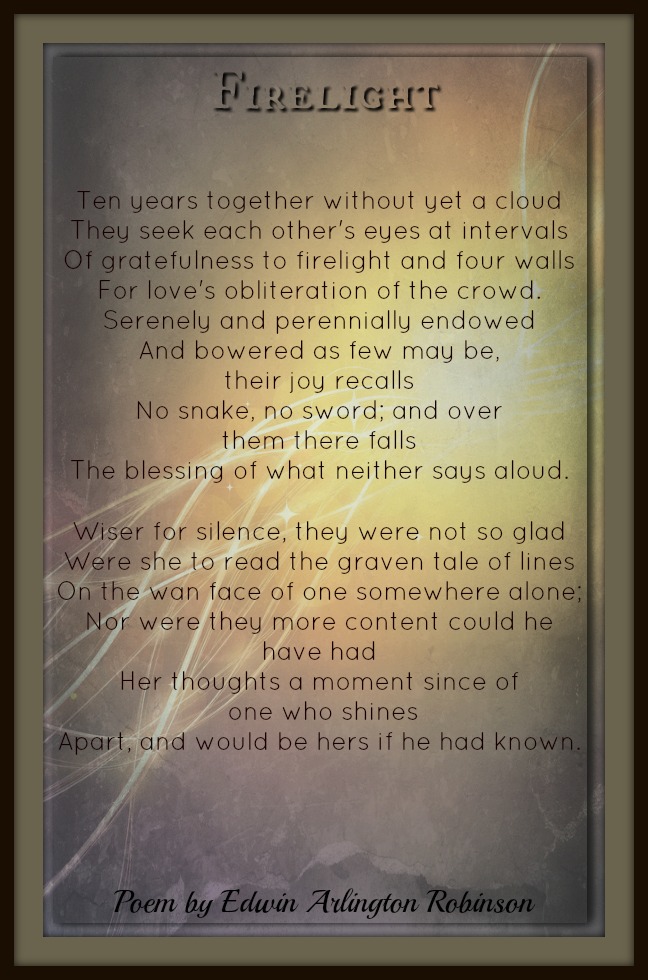 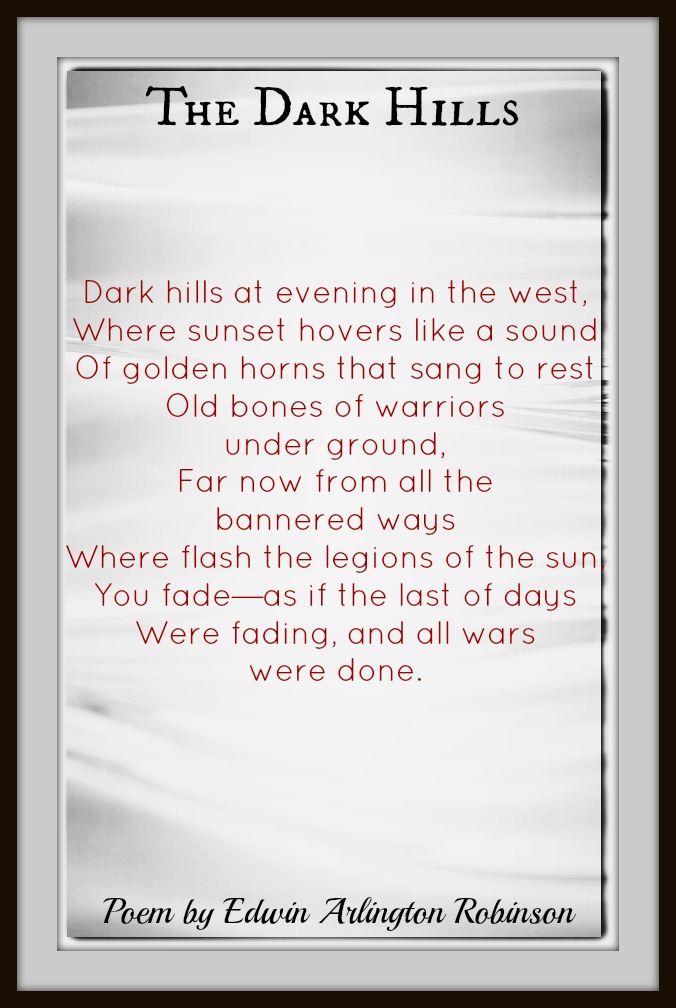 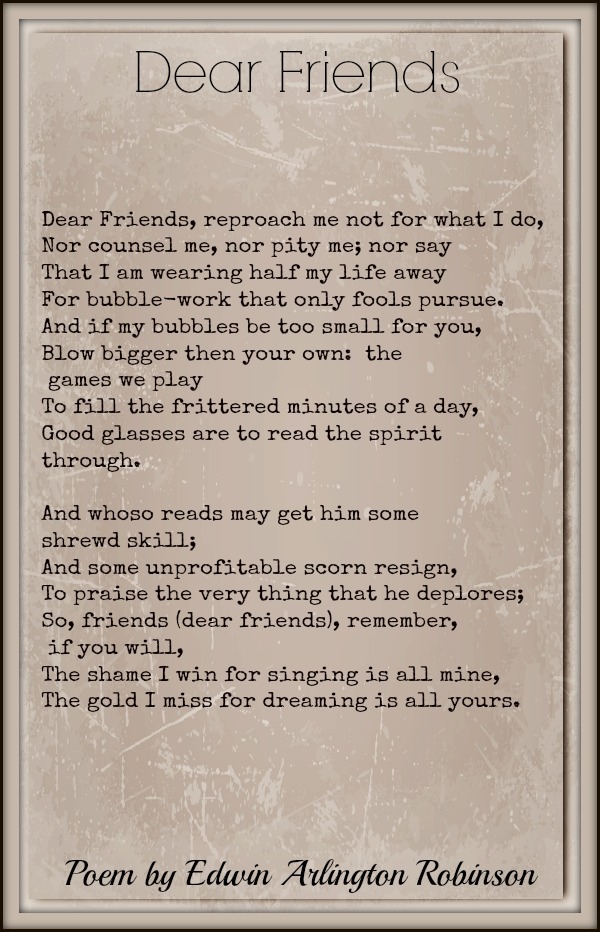 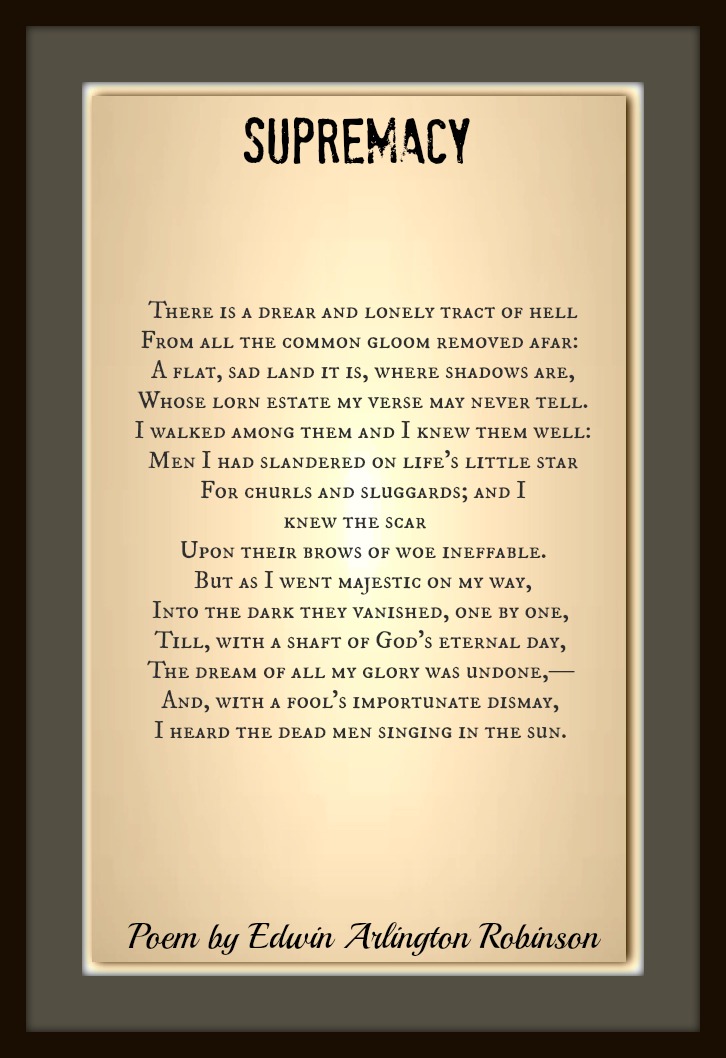 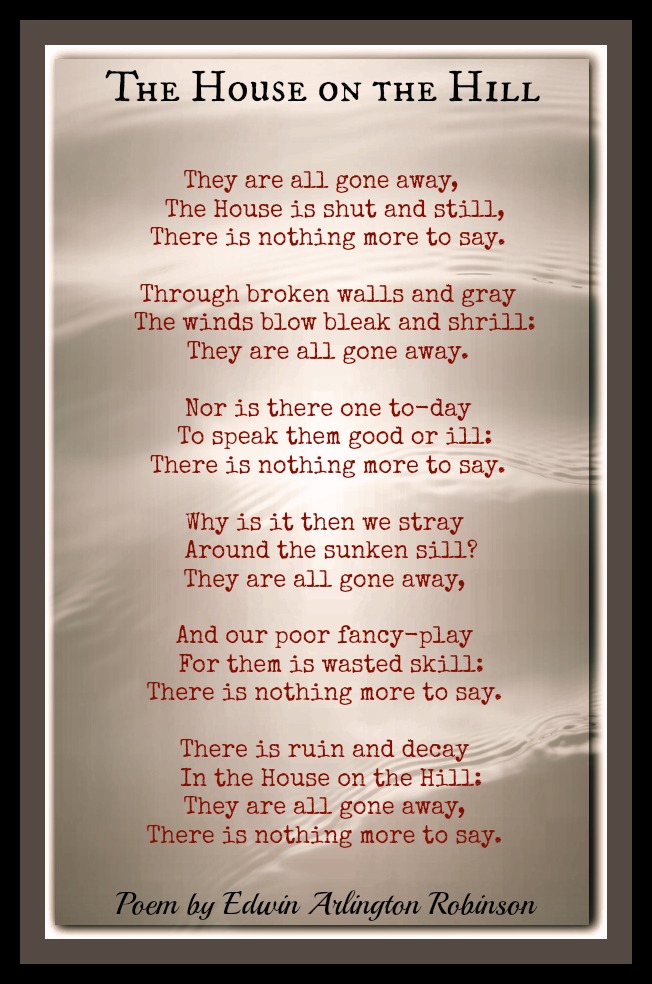 The Children of the Night For those that never know the light, The darkness is a sullen thing; And they, the Children of the Night, Seem lost in Fortune's winnowing. But some are strong and some are weak, — And there's the story. House and home Are shut from countless hearts that seek World-refuge that will never come. And if there be no other life, And if there be no other chance To weigh their sorrow and their strife Than in the scales of circumstance, 'T were better, ere the sun go down Upon the first day we embark, In life's imbittered sea to drown, Than sail forever in the dark. But if there be a soul on earth So blinded with its own misuse Of man's revealed, incessant worth, Or worn with anguish, that it views No light but for a mortal eye, No rest but of a mortal sleep, No God but in a prophet's lie, No faith for "honest doubt" to keep; If there be nothing, good or bad, But chaos for a soul to trust, — God counts it for a soul gone mad, And if God be God, He is just. And if God be God, He is Love; And though the Dawn be still so dim, It shows us we have played enough With creeds that make a fiend of Him. There is one creed, and only one, That glorifies God's excellence; So cherish, that His will be done, The common creed of common sense. It is the crimson, not the gray, That charms the twilight of all time; It is the promise of the day That makes the starry sky sublime; It is the faith within the fear That holds us to the life we curse; — So let us in ourselves revere The Self which is the Universe! Let us, the Children of the Night, Put off the cloak that hides the scar! Let us be Children of the Light, And tell the ages what we are! Reuben Bright Because he was a butcher and thereby Did earn an honest living (and did right), I would not have you think that Reuben Bright Was any more a brute than you or I; For when they told him that his wife must die, He stared at them, and shook with grief and fright, And cried like a great baby half that night, And made the women cry to see him cry. And after she was dead, and he had paid The singers and the sexton and the rest, He packed a lot of things that she had made Most mournfully away in an old chest Of hers, and put some chopped-up cedar boughs In with them, and tore down the slaughter-house. Bewick Finzer Time was when his half million drew The breath of six per cent; But soon the worm of what-was-not Fed hard on his content; And something crumbled in his brain When his half million went. Time passed, and filled along with his The place of many more; Time came, and hardly one of us Had credence to restore, From what appeared one day, the man Whom we had known before. The broken voice, the withered neck, The coat worn out with care, The cleanliness of indigence, The brilliance of despair, The fond imponderable dreams Of affluence,—all were there. Poor Finzer, with his dreams and schemes, Fares hard now in the race, With heart and eye that have a task When he looks in the eye Of one who might so easily Have been in Finzer's place. He comes unfailing for the loan We give and then forget; He comes, and probably for years Will he be coming yet,— Familiar as an old mistake, And futile as regret.. The Clerks I did not think that I should find them there When I came back again; but there they stood, As in the days they dreamed of when young blood Was in their cheeks and women called them fair. Be sure, they met me with an ancient air,— And yes, there was a shop-worn brotherhood About them; but the men were just as good, And just as human as they ever were. And you that ache so much to be sublime, And you that feed yourselves with your descent, What comes of all your visions and your fears? Poets and kings are but the clerks of Time, Tiering the same dull webs of discontent, Clipping the same sad alnage of the years. Cassandra I heard one who said: "Verily, What word have I for children here? Your Dollar is your only Word, The wrath of it your only fear. "You build it altars tall enough To make you see but you are blind; You cannot leave it long enough To look before you or behind. "When Reason beckons you to pause, You laugh and say that you know best; But what it is you know, you keep As dark as ingots in a chest. "You laugh and answer, 'We are young; Oh, leave us now, and let us grow:' Not asking how much more of this Will Time endure or Fate bestow. "Because a few complacent years Have made your peril of your pride, Think you that you are to go on Forever pampered and untried? "What lost eclipse of history, What bivouac of the marching stars, Has given the sign for you to see Milleniums and last great wars? "What unrecorded overthrow Of all the world has ever known, Or ever been, has made itself So plain to you, and you alone? "Your Dollar, Dove, and Eagle make A Trinity that even you Rate higher than you rate yourselves; It pays, it flatters, and it's new. "And though your very flesh and blood Be what the Eagle eats and drinks, You'll praise him for the best of birds, Not knowing what the eagle thinks. "The power is yours, but not the sight; You see not upon what you tread; You have the ages for your guide, But not the wisdom to be led. "Think you to tread forever down The merciless old verities? And are you never to have eyes To see the world for what it is? "Are you to pay for what you have With all you are?"—No other word We caught, but with a laughing crowd Moved on. None heeded, and few heard. Dear Friends Dear Friends, reproach me not for what I do, Nor counsel me, nor pity me; nor say That I am wearing half my life away For bubble-work that only fools pursue. And if my bubbles be too small for you, Blow bigger then your own: the games we play To fill the frittered minutes of a day, Good glasses are to read the spirit through. And whoso reads may get him some shrewd skill; And some unprofitable scorn resign, To praise the very thing that he deplores; So, friends (dear friends), remember, if you will, The shame I win for singing is all mine, The gold I miss for dreaming is all yours. Alma Mater He knocked, and I beheld him at the door— A vision for the gods to verify. "What battered ancient is this," thought I, "And when, if ever, did we meet before?" But ask him as I might, I got no more For answer than a moaning and a cry: Too late to parley, but in time to die, He staggered, and lay ahapeless on the floor. When had I known him? And what brought him here? Love, warning, malediction, fear? Surely I never thwarted such as he?— Again, what soiled obscurity was this: Out of what scum, and up from what abyss, Had they arrived—these rags of memory. Souvenir A vanished house that for an hour I knew By some forgotten chance when I was young Had once a glimmering window overhung With honeysuckle wet with evening dew. Along the path tall dusky dahlias grew, And shadowy hydrangeas reached and swung Ferociously; and over me, among The moths and mysteries, a blurred bat flew. Somewhere within there were dim presences Of days that hovered and of years gone by. I waited, and between their silences There was an evanescent faded noise; And though a child, I knew it was the voice Of one whose occupation was to die. How Annandale Went Out “They called it Annandale—and I was there To flourish, to find words, and to attend: Liar, physician, hypocrite, and friend, I watched him; and the sight was not so fair As one or two that I have seen elsewhere: An apparatus not for me to mend— A wreck, with hell between him and the end, Remained of Annandale; and I was there. “I knew the ruin as I knew the man; So put the two together, if you can, Remembering the worst you know of me. Now view yourself as I was, on the spot— With a slight kind of engine. Do you see? Like this … You wouldn’t hang me? I thought not.” A Happy Man When these graven lines you see, Traveller, do not pity me; Though I be among the dead, Let no mournful word be said. Children that I leave behind, And their children, all were kind; Near to them and to my wife, I was happy all my life. My three sons I married right, And their sons I rocked at night; Death nor sorrow never brought Cause for one unhappy thought. Now, and with no need of tears, Here they leave me, full of years,— Leave me to my quiet rest In the region of the blest. Credo I cannot find my way: there is no star In all the shrouded heavens anywhere; And there is not a whisper in the air Of any living voice but one so far That I can hear it only as a bar Of lost, imperial music, played when fair And angel fingers wove, and unaware, Dead leaves to garlands where no roses are. No, there is not a glimmer, nor a call, For one that welcomes, welcomes when he fears, The black and awful chaos of the night; For through it all—above, beyond it all— I know the far sent message of the years, I feel the coming glory of the light. Ballad of Dead Friends As we the withered ferns By the roadway lying, Time, the jester, spurns All our prayers and prying — All our tears and sighing, Sorrow, change, and woe — All our where-and-whying For friends that come and go. Life awakes and burns, Age and death defying, Till at last it learns All but Love is dying; Love's the trade we're plying, God has willed it so; Shrouds are what we're buying For friends that come and go. Man forever yearns For the thing that's flying. Everywhere he turns, Men to dust are drying, — Dust that wanders, eying (With eyes that hardly glow) New faces, dimly spying For friends that come and go. ENVOY And thus we all are nighing The truth we fear to know: Death will end our crying For friends that come and go. Thomas Hood The man who cloaked his bitterness within This winding-sheet of puns and pleasantries, God never gave to look with common eyes Upon a world of anguish and of sin: His brother was the branded man of Lynn; And there are woven with his jollities The nameless and eternal tragedies That render hope and hopelessness akin. We laugh, and crown him; but anon we feel A still chord sorrow-swept, — a weird unrest; And thin dim shadows home to midnight steal, As if the very ghost of mirth were dead — As if the joys of time to dreams had fled, Or sailed away with Ines to the West. The Companion Let him answer as he will, Or be lightsome as he may, Now nor after shall he say Worn-out words enough to kill, Or to lull down by their craft, Doubt, that was born yesterday, When he lied and when she laughed. Let him and another name for the starlight on the snow, Let him teach her till she know That all seasons are the same, And all sheltered ways are fair,— Still, wherever she may go, Doubt will have a dwelling there. Tact Observant of the way she told So much of what was true, No vanity could long withhold Regard that was her due: She spared him the familiar guile, So easily achieved, That only made a man to smile And left him undeceived. Aware that all imagining Of more than what she meant Would urge an end of everything, He stayed; and when he went, They parted with a merry word That was to him as light As any that was ever heard Upon a starry night. She smiled a little, knowing well That he would not remark The ruins of a day that fell Around her in the dark: He saw no ruins anywhere, Nor fancied there were scars On anyone who lingered there, Alone below the stars. The Unforgiven When he, who is the unforgiven, Beheld her first, he found her fair: No promise ever dreamt in heaven Could have lured him anywhere That would have nbeen away from there; And all his wits had lightly striven, Foiled with her voice, and eyes, and hair. There's nothing in the saints and sages To meet the shafts her glances had, Or such as hers have had for ages To blind a man till he be glad, And humble him till he be mad. The story would have many pages, And would be neither good nor bad. And, having followed, you would find him Where properly the play begins; But look for no red light behind him— No fumes of many-colored sins, Fanned high by screaming violins. God knows what good it was to blind him Or whether man or woman wins. And by the same eternal token, Who knows just how it will all end?— This drama of hard words unspoken, This fireside farce without a friend Or enemy to comprehend What augurs when two lives are broken, And fear finds nothing left to mend. He stares in vain for what awaits him, And sees in Love a coin to toss; He smiles, and her cold hush berates him Beneath his hard half of the cross; They wonder why it ever was; And she, the unforgiving, hates him More for her lack than for her loss. He feeds with pride his indecision, And shrinks from what wil not occur, Bequeathing with infirm derision His ashes to the days that were, Before she made him prisoner; And labors to retrieve the vision That he must once have had of her. He waits, and there awaits an ending, And he knows neither what nor when; But no magicians are attending To make him see as he saw then, And he will never find again The face that once had been the rending Of all his purpose among men. He blames her not, nor does he chide her, And she has nothing new to say; If he was Bluebeard he could hide her, But that's not written in the play, And there will be no change to-day; Although, to the serene outsider, There still would seem to be a way. |
Return To Famous Poems
Edwin Arlington Robinson Poems
